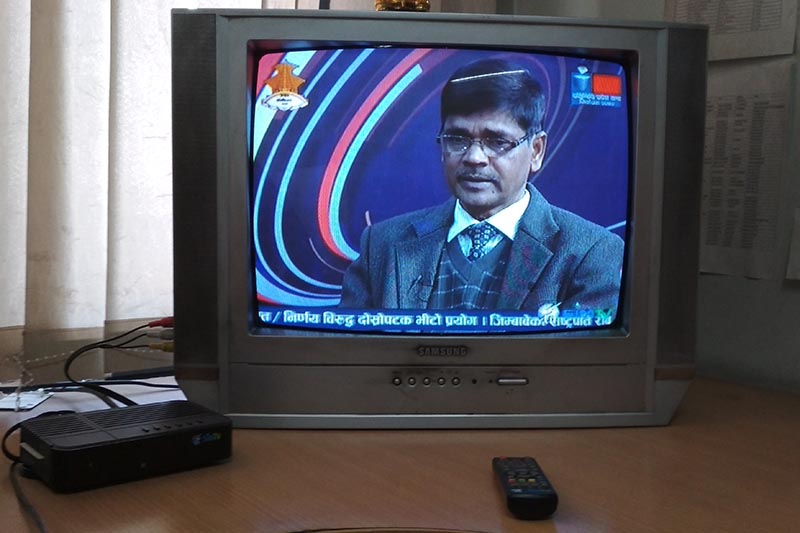Clean feed policy: Towards full implementation
As the government has enforced the clean feed policy in a determined way, cable operators and entrepreneurs should support the government in implementing the policy. Although the general people have suffered, there is no doubt that they will also be supportive of the policy
The government has implemented the clean feed policy with effect from October 23. The decision was made by the government last year, and accordingly cable TV operators and entrepreneurs were instructed to make preparations for it. But the cable TV operators and entrepreneurs are ill-prepared to support the government’s policy. In fact, they had asked the government not to implement the decision for six months, citing that they were not prepared for it due to their inability to import the required equipment owing to the outbreak of COVID-19. However, the government did not listen to them.
As a matter of fact, the clean feed policy has been implemented in Nepal after 11 years. In 2066 BS, the Nepal Advertising Association and the Nepal Economic Forum had jointly demanded that the government implement the policy.
The Advertisement (Regulations) Act 2076 has provision for implementing the clean feed policy. The Act has also provision for the formation of the Advertisement Board designed to make the clean feed policy effective. The functions of the Board are, among others, formulating national policy regarding advertising and recommend it to the Ministry of Communication and Information Technology, testing the standard of ads to be broadcast, formulating the code of conduct regarding advertising, restricting the broadcast of ads that are against the laws and monitoring foreign channels and recommending action against them if they go against the criteria fixed by the government.
It would be germane to mention the National Broadcasting Act 2049. The Act distinguishes domestic and foreign channels. As per the Act, foreign channels are required to obtain licences for downlinks in Nepal, but it is silent on whether authorised salesmen should be stationed in the country by foreign channels. So some channels have obtained licences for the distribution of signals.
Those without such licences broadcast direct from India, availing themselves of the privileges granted by the Indian government to its states.
The need for implementing the clean feed policy has been felt for long. There are basically two types of broadcasting: pay channels and free-to-air channels.
Pay channels levy payment on viewers but do not air ads. So they are clean feedbased.
On the other hand, free-to-air channels broadcast programmes free of charge but air ads. Before the clean feed policy was implemented, Indian channels, which are dominating the TV realm in Nepal, were neither pay channels nor free-to-air channels. They would levy charges on viewers and still air commercials on Nepali TV. Foreign TV channels were thus reaping double benefit. On the one hand, they were charging multiple system operators (MSOs) and digital cable operators for broadcasting their programmes, while on the other they were airing commercials of multinational companies and conglomerates.
The commercials made by multinational companies and conglomerates casting foreign celebrities and featuring foreign locations would disregard Nepali culture, social customs, traditions, life styles and other fundamental conventions; rather, they would promote foreign culture, norms and traditions to the extent of roiling the ethnic and linguistic harmony prevailing in various communities in the country.
With the enforcement of the clean feed policy, such a trend will hopefully come to an end. Foreign channels will have to air ad-free programmes.
They are not allowed to broadcast commercials, logos, promos and the like. What is more, even dubbed commercials cannot be aired on TV.
What is more encouraging is the fact that the advertising market in Nepal will grow further. The market is now worth Rs. 22 billion, which is expected to jump to Rs. 33 billion.
If multinational companies and conglomerates want to air commercials on Nepali TV, they will have to shoot them in the country itself. Further they will have to employ local resources and hire Nepali artistes.
This will promote the branding of Nepali products, and Nepali channels will get ads, which will help increase their income. This, in turn, will encourage journalists to work with more zeal and honesty and also help in producing quality TV programmes.
Entrepreneurs working in the relevant field and stakeholders are happy with the government’s clean feed policy. To recall, the clean feed policy was formulated in 2073 BS and came into effect after four years. However, the entrepreneurs have demanded that the policy be implemented not only in the mass media (TV) but also in the telecommunication sector (the Internet and OTT). They argue that commercials are shown on the Internet and OTT (over the top) broadcasting but not in cable, dish-home and satellite broadcasting.
They want an end to such discrimination, which is warranted.
With the enforcement of the clean feed policy, TV viewers have been affected for no fault of theirs. With some foreign channels going off the air for failing to come up with clean feed-compatible programmes, the viewers have been deprived of their favourite programmes such as sports. A price hike in charges has also been feared. On the other hand, Internet and OTT broadcasting may get a shot-inthe-arm, which may precipitate an outflow of money.
As the government has enforced the clean feed policy in a determined way, cable operators and entrepreneurs should support the government in implementing the policy. Although the general people have suffered, there is no doubt that they will also be supportive of the policy.
Sooner or later, most channels will be back on the air.
After all, the policy will give the adverting industry a leg-up, boost up Nepali channels, encourage Nepali artistes in their profession, promote Nepali products and preserve the country’s culture, socio-economic norms and traditions.
Feature image: File






